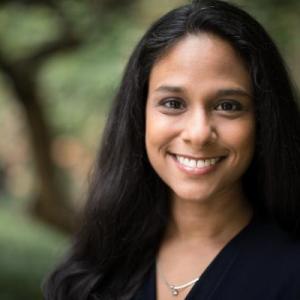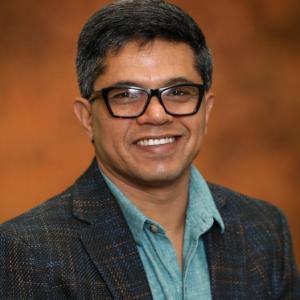Short description:
Anjali Adukia is an assistant professor at the University of Chicago Harris School of Public Policy and the College. In her work, she is interested in understanding how to reduce inequalities such that children from historically disadvantaged backgrounds have equal opportunities to fully develop their potential. Her research is focused on understanding factors that motivate and shape behavior, preferences, attitudes, and educational decision-making, with a particular focus on early-life influences. She examines how the provision of basic needs—such as safety, health, justice, and representation—can increase school participation and improve child outcomes in developing contexts.
Adukia completed her doctoral degree at the Harvard University Graduate School of Education, with an academic focus on the economics of education. Her work has been funded from organizations such as the William T. Grant Foundation, the National Academy of Education, the Spencer Foundation, and the Institute of Education Sciences. Her dissertation won awards from the Association for Public Policy Analysis and Management (APPAM), Association for Education Finance and Policy (AEFP), and the Comparative and International Education Society (CIES). Adukia received recognition for her teaching from the University of Chicago Feminist Forum. She completed her masters of education degrees in international education policy and higher education (administration, planning, and social policy) from Harvard University and her bachelor of science degree in molecular and integrative physiology from the University of Illinois at Urbana-Champaign. She is a faculty research fellow of the National Bureau of Economic Research and a faculty affiliate of the University of Chicago Education Lab and Crime Lab. She is on the editorial board of Education Finance and Policy. She was formerly a board member of the Young Nonprofit Professionals Network – San Francisco Bay Area.
Short description:
Dr. Prakash Kashwan is an educator, author, and scholar, whose work cuts across the fields of climate governance, environmental and climate justice, and international affairs. Currently, he is an Associate Professor of Environmental Studies at Brandeis University. Dr. Kashwan is the current Chair of the Environmental Studies Section (ESS), International Studies Association (ISA), co-founder of the Climate Justice Network, and Editor of the journal Environmental Politics. He is the author of Democracy in the Woods (OUP, 2017) and co-author of Decolonizing Environmentalism (Bloomsbury, 2025).
Short description:
I am Assistant Clinical Professor of Urban Planning and Public Service and Director of the Urban Planning program at NYU Wagner. My research and practice centers on the political economy of disasters, primarily in small island developing states. I recently won the 2021-2022 Outstanding Decentralization Paper Award for Latin America and the Caribbean recognizing my novel in-depth analysis of Haiti's institutional challenges over the past three decades.
Short description:
Ph.D. Candidate in Economics at University. Economist and Data Scientist with exceptional writing skills and 9 years of applied research experience. Demonstrated expertise in development economics, macroeconomics, econometrics. My primary areas of research are Econometrics and Statistics, Macroeconometrics, Development Economics, Climate change, and Financial Economics. I am also interested in applying Machine Learning/Text Analysis and Artificial Intelligence techniques for Labor Market, Housing Markets, Monetary Policy, Real Estate Finance, Household Finance, Financial Studies, and Public Policies.
Short description:
I am an economist and a social policy researcher interested in the analysis and evaluation of public policy in the areas of education, poverty alleviation and low income benefits. My recent research focuses on the role of markets and institutions in producing and perpetuating social inequalities and how social policy can effectively ameliorate these inequalities in both developing and developed societies.






